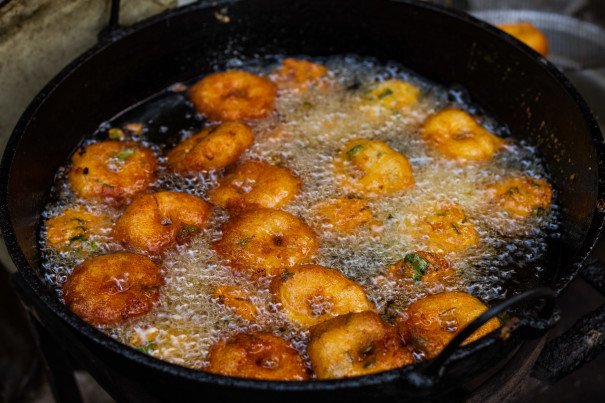
Now That Is A Real Tamil Breakfast

Now That Is A Real Tamil Breakfast
Vada in Passikudah
Sathish yawned and stretched in his chair, an ashen snake of tobacco smoke unfurling from his lips. “Everybody here has fired a weapon,” he said, taking another sharp drag. He gestured to the road. “Those children, the ones playing cricket, they have all fired guns. Some of them have killed people.” Listening to him speak, sitting there smoking in the gentle morning, I suddenly didn’t feel much like eating.
It was 9 am in Passikudah, a dusty fishing village on Sri Lanka’s east coast, and my host had just begun to talk war over a breakfast of Vada: spicy, gram flour fritters that are ubiquitous in the region.
As I worked my way through a plate of the savory doughnuts, always taken with a cup of chai, Sathish told me how the Sri Lankan civil war had hit Pasikudah in 1983, when the town came under the control of the Tamil Tiger rebel group. They had been fighting for a separate Tamil state on the island, controlling much of the north and east for nearly 25 years until the region was ‘liberated’ in 2007.
That’s when things got really bad for Passikudah. Liberation arrived in the form of indiscriminate shelling and firefights carried out in the middle of town, with civilian casualties in the hundreds. One day when the shelling became too fierce to bear, Sathish fled with his pregnant wife to a nearby forest. “As we ran to the jungle there was a blast and everything went dark. I found my wife unconscious on the floor. She survived, but our baby was gone,” he told me.
At this point, my food had grown cold and the tea stewed, becoming too bitter to drink. Passikudah was waking up, the smell of incense and freshly cooked rice curdling in the dense, sticky morning. By now, rickshaw horns and shrill Indian pop music could be heard, the noise causing Sathish to stir a little and reach for his cigarettes once more.
“The government say that their army liberated us from an occupation, but now it feels more like an occupation than ever,” Sathish said. It was true. During my time in the area I had been surprised at how consistently strong the military presence was, and I had heard horror stories of mysterious disappearances and shocking abuse meted out by the army.
“They bother us for no reason, they mock our religion; I think they want to kill Tamil culture,” he continued. “But one of the things they can’t take is our food, like these Vada. Now that is a real Tamil breakfast. Do you like them?” I did. But by this point they were the last thing on my mind. Nonetheless I nodded, took a bite and smiled at my host, not knowing what else to do.